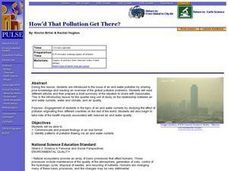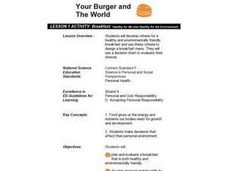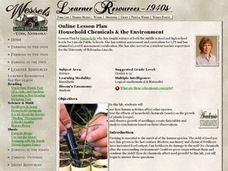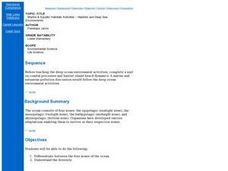Curated OER
Which Sand Contains The Most Salt?
Students investigate the salinity levels of sand samples taken from several different sources. They conduct tests and observations to measure the current salt levels. They develop a hypothesis from the experiment to determine the factors...
Curated OER
Thinking About Science and the Environment
Students read 3 or 4 Science articles and complete a chart. In this scientific thought concept lesson, students play a game using their chart to reinforce their ideas and concepts. Students make a list of the bigger ideas...
Curated OER
INDUSTRY AND THE ENVIRONMENT
Seventh graders create a final project called Industry X (which was previously researched in the unit) has plans to build in town. There is a special town meeting scheduled to discuss this matter and allow everyone to express their...
Curated OER
Environment: How'd That Pollution Get There?
Students examine how global wind and water patterns aid in the spread of worldwide pollution. In groups, they read articles about the domino effect of pollution and create posters displaying its journey. On blank world maps, students...
Curated OER
The Living Environment
Sixth graders show what they know about plant and animal cells. In this cell project instructional activity, 6th graders get to choose a project based on their learning style. They can create a visual representation of cells, auditory...
Curated OER
Breakfast: Healthy for Me and Healthy for the Environment
Students develop criteria for a healthy and environmentally friendly breakfast and use these criteria to design a breakfast menu. They use a decision chart to evaluate their choices which is imbedded in this plan.
Curated OER
Household Chemicals & the Environment
Students conduct a laboratory experiment designed to investigate the effects of chemicals, soil quality and pollution on seed growth and plant yield. They consider how best to maximize agriculture in the long term.
Curated OER
Environment Debate Game
Students participate in a role-play activity to discuss environmental problems on which they have previously conducted research.
Curated OER
Habitats and Deep Sea Environments
Young scholars examine and identify the characteristics of the four zones of the ocean. They discover the amount of diversity in marine habitats. They also explore the adaptations organisms have that have allowed them to survive.
Curated OER
The Living Environment
Students explore the cycles of an ecosystem. In this environmental science lesson, students work in groups to research the nitrogen cycle, the water cycle, or the oxygen-carbon dioxide cycle. Students prepare a PowerPoint or other...
Curated OER
Media Stereotypes: How Differences Divide
Young scholars differentiate between generalizations and stereotypes and compare and contrast gender representation. Finally, they critically analyze media for gender stereotypes. They look at magazines and create collages to focus in...
Curated OER
Yeast Cells and their Environment
Pupils study the scientific method and explore how to design an experiment. In this investigative lesson students explore and hypothesis an experiment then carry it out to find the results.
Curated OER
Applied Science - Built Environment Pre Lab (Morse Code)
Students study communication. In this telegraph lesson, students examine Morse code and the composition of an elementary telegraph circuit. They listen to a presentation and try to create Morse Code messages on a worksheet. This lesson...
Curated OER
Comparing the Similarities and Differences of Medieval Castles
Students compare and contrast a Japanese castle with a Welsh castle. In groups, pupils use the internet to research specified topics on a castle. They explore the government, construction and military function of the area. Classmates...
Curated OER
Peru Geography and the Environment
Fourth graders draw maps of Peru and examine how Peru is a geographically diverse country.
Curated OER
Applied Science- Built environment Lab (Trains)
Students examine transportation. In this train design lesson, students study how trains work and how to efficiently design a track by working with an electric train set. As a class they compare various types of trains and work...
Curated OER
Integrating Physical Science and the Geological Environment
Students undertake a series of experiments and activities related to geology, especially in Connecticut. They evaluate types of rocks, minerals, and crystals, exploring the main concepts of geology.
Curated OER
Simple Machines, Engines and the Environment
Students examine and describe the six main simple machines. In groups, they work with an inclined plane to calculate the ideal and actual mechanical advantages of the plane. Using their results, they must determine the efficiency of the...
Curated OER
Animals and Environments
Students listen to stories and identify animals and their young. In this animals lesson, students view videos about farm animals and create illustrations to show how animal babies change over time. Students discuss...
Curated OER
A River Ran Wild: An Environmental History
The Nashua River serves as the focal point of an investigation of the treatment of and care for natural resources. A reading of A River Rand Wild: An Environmental History by Lynne Cherry, launches the study and class members consider...
Wilderness Classroom
Pollution
Educate scholars on pollution—air, water, and land—with a series of lessons that begin with a thorough explanation of each type. Learners then take part in three activities to reinforce the importance of reducing pollution. They...
Curated OER
Recognizing Litter
When does trash become litter? Use this litter awareness lesson to help them understand the importance of trash disposal. Get learners engaged by reading Nancy Loewen's Lady Lulu Liked to Litter (not included). After discussing what...
Marine Institute
Water Pollution
Sixth graders investigate the various types of pollutants found in water and ways to help prevent water pollution. Through a hands-on experiment, learners create samples of polluted water by mixing water with vegetable oil, dirt,...
Chicago Botanic Garden
Accessing Prior Knowledge: Global Climate Change Survey
Begin a unit on weather and climate change by assessing prior knowledge of the topic. Learners respond to a survey with questions that ask what they think causes climate change, the effects of climate change, and if it is important...























